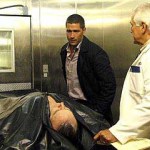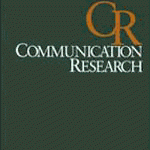
The Daily Show With Jon Stewart
M - Th 11p / 10c
Tom Hanks
thedailyshow.com
Daily Show Full Episodes
Economic Crisis
Political Humor
Blockbuster movies, The Daily Show: As I discuss in forthcoming articles, these are the new tools for "going broad" and motivating interest among mass audiences on issues related to science and society. Watch Tom Hanks above have fun and talk some of the implications of Angels and Demons. You can fret over the accuracy of Hanks' banter when it comes to anti-matter, but some portion of the Daily Show audience and the audience for the…
Not only will Angels & Demons likely jump start conversations about physics, as some scientists hope, but the summer blockbuster will also be a launching pad for audiences to drive home discussing the relationship between science and religion.
I'm heading up to Georgetown tonight to check out the film and will have more to report on this angle. But for now, check out this short trailer put together by the Angels & Demon's publicity team addressing the science and religion theme in the film.
Jacob with his black-clad counterpart.
Much was revealed in last night's fifth season finale for Lost, the penultimate for the series. Here's my take:
Apparently Jacob is a Judeo-Christian God-like figure, the "others" and Richard are his angels, and the survivors of Oceanic Flight 815, like many a vessel previously crashed at the island by Jacob, are his human flock. Jacob, or God, appears benevolently in the survivors' off-Island lives, sometimes intervening to save their lives while at other times offering encouragement or reassurance. Yet as Jacob mentions in the season finale, each…
There are a lot of Twitter dismissives among science bloggers, but the mobile technology has promise, journalists and others just have to understand how to structure its use successfully.
One such constructive application was pioneered here at American University by journalism professor David Johnson and used by students and collaborators in last year's November election. Read or tweet about Twitter Vote Report, an application that is cleaning up among this year's journalism and technology awards.
Last week I bought my tickets for the Wilco concert in July at Wolf Trap. The "alt country rock" band from Chicago has sired two of the best albums of the last decade, starting with Yankee Hotel Foxtrot and followed by A Ghost is Born. (Best heard on vinyl.)
I saw them in concert last year at the 930 Club and have eagerly awaited their lastest album release which fans will be happy to know is now available for free online streaming in its entirety. There's a citrus clean sound to this latest release, perhaps reflecting a lifestyle change for the band.
On the road giving talks this spring and in several forthcoming articles, I recommend that one way to widen the net in terms of public engagement is to hook science around entertainment media. A leading initiative I spotlight is the National Academies' Science & Entertainment Exchange which pairs scientists with TV and film producers. A recent success was the incidental news coverage generated by scientific consultation on the movie-version of The Watchmen.
This week comes another great strategy for "going broad" with science communication. As the NSF spotlights, more than 45 lectures are…
In following up in my my earlier post today regarding the season finale for Lost, google traffic to my blog points back to this site which proposes a provocative theory that appears to make a lot sense. Check it out for yourself.
Yesterday I focused on the need for "cross-talk" on matters of science policy, highlighting for example the importance of a middle ground perspective on science and religion. It had escaped my eye, but at the Washington Post on Sunday, columnist Kathleen Parker apparently is thinking along similar lines, spotlighting a recent "Candle in the Dark" initiative from Francis Collins.
I don't normally agree with Parker, yet I continue to read her and respectively assess her ideas. For example, I think in the past she hasn't given the Obama administration enough credit for incorporating a range of…
It's the season finale for Lost tonight and the narrative threads are actually seeming to fit together. My only lingering question is where exactly Jack's father fits in the mysterious mosaic of the island. What do readers think?
Is Jack's father Jacob, as someone suggested to me the other day? Doubt it, but it seems we should find out more on this angle tonight.
The Washington Post profiles Barton Seaver today, the chef who put 14th street's Saint X on the map foodwise and then helped launch the ultra-successful Hook in Georgetown. Seaver is now opening a fish market and restaurant around the corner from this blogger in Logan Circle, strategically proximate to the busiest Whole Foods in the country.
More importantly, the article discusses how Seaver views food as a way to engage Americans on issues of sustainability. It's one more example of a novel medium for environmental communication. Here's the quick summary on his approach with affirmations…
Several colleagues at the University of Wisconsin-Madison have a new study out that shows not surprisingly that like-minded conversations drive attitude extremity relative to science policy.
Analyzing data from a national panel survey conducted between 2002 and 2005, graduate student Andrew Binder and his collaborators find that after controlling for demographics and news use, like-minded discussion pushed respondents' position on stem cell research to the extreme ends of the distribution, either towards strong support or strong opposition.
The study comes out of the research group at…
At the Washington Post today, Dana Milbank reviews Rush Limbaugh's Monday program. The peg is Wanda Sykes' comments at this weekend's White House Correspondents Dinner.
Perhaps of greater interest, later in the column, Milbank reports on this line delivered by Rush during his Monday program:
Among callers to his show yesterday, the opinions of Limbaugh were more on the side of extravagant admiration: "There are no words to adequately describe our appreciation for your program and your individual accomplishments as a patriot."
The host had a similar sentiment: "I normally don't pat myself on…
The Washington Post's media reporter has joined the ranks of those who fear the imminent demise of journalism. I don't share this outlook. In fact, I see journalism--and science journalism in particular--on the edge of transformation and renewal, but more on this over the coming weeks.
In the meantime, consider what Howard Kurtz has to offer in his column today.
Over at Columbia Journalism Review, Curtis Brainard has an excellent round-up and analysis of what might be afoot at Scientific American as it merges editorial direction with Nature Publishing Group and as longtime editor John Rennie steps down.
If you read the NY Times or WPost in print, you've probably noticed over the past 6 months the regular full page ads that have been placed by Monsanto. Similar to the nuclear energy industry, Monsanto is seeking to re-frame and re-position food biotechnology as a "middle way" technology needed to adapt to climate change.
For example, one recent ad running at the NY Times headlines: "9 billion people to feed. A changing climate. NOW WHAT?" In smaller print the ad continues with these themes adding to it a narrative wrapped around social progress with the beneficiaries farmers and people:…
Last week, John Holdren appeared for a 45 minute interview on NPR Science Friday with host Ira Flatow. Below the fold, I have pasted excerpts of his comments relative to climate change policy options as well as investment in nuclear energy. In the interview, Holdren also had the chance to elaborate on his past comments on geo-engineering. Here's what he said:
FLATOW:...Let's talk a little bit about - back to energy a little bit and in global climate change. I know you've been in the press a lot, in the media a lot, talking about geo-engineering as something that is - you were quoted as, "…
Everyone from Maureen Dowd to Allessandra Stanley have speculated as to why Elizabeth Edwards would endure the pain to go public with how she has dealt with her husband John's infidelity.
But there is one key motivation yet to be discussed: Elizabeth's book and publicity tour may in fact be a brilliant communication strategy to repair John's image and to enable his political future.
Last August, I remarked on just how perfectly choreographed Edwards' appearance on Nightline had been, suggesting that it was clear that the skilled trial attorney had solicited direction from crisis…
If you are like me, you are looking forward to the May 27 Champions League showdown between Man United and Barcelona. No doubt, many here in DC will be taking a break from work to head to a nearby pub or to watch from the office. Even Obama seems to be a soccer fan. In an appearance on Univision last week, he spoke about his hopes for securing the US as a host for a future World Cup and the growth of the game in the States.
With many ScienceBlogs readers probably taking in the new Star Trek film this weekend, I've opened this post as a thread for discussion.
What do you think, a pitch perfect re-invention of the classic series or too popularized to appeal to devoted fans of the original?
Trekkies Bash New Star Trek Film As 'Fun, Watchable'
The only thing missing from the pitch perfect new Star Trek film is a strong soundtrack. The actors have been brilliantly cast and Zachary Quinto as Spock steals the show. The theaters in Georgetown last night were packed, and not by your typical Trekkie crowd. It looked like the film had broad demographic appeal. Expect Star Trek to make more than $70 million this weekend, tops for the eleven film series.
Still, as the news clip above indicates, hardliner Trek fans are apparently disappointed that the newest version lacks a heavy handed…



